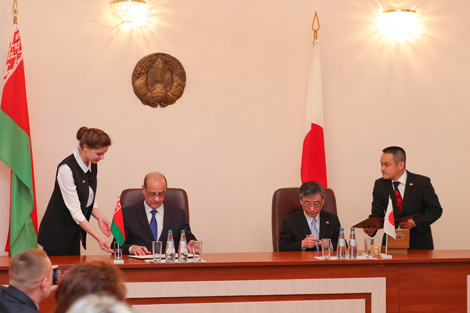Opinions & Interviews
Skakun: Grassroots Program contributes to Belarus-Japan cooperation

MINSK, 2 February (BelTA) - The Grassroots Program promotes the cooperation between Japan and Belarus, Valery Skakun, the director of the Department of Humanitarian Affairs of the Belarus President Property Management Directorate, said at a ceremony to sign the grant-contracts under the Grant Assistance for Grassroots Human Security Projects (GGP) Program implemented by the Japanese government, BelTA has learned.
“Being the body implementing the state policy in humanitarian affairs, the department welcomes the substantial contribution of the Japanese government to the efforts to mitigate the impact of the Chernobyl disaster. Today our cooperation continues to develop successfully and consistently. There is mutual understanding and mutual assistance,” Valery Skakun noted.
As part of the long-term humanitarian bilateral cooperation Belarus has received $6.5 million in foreign gratuitous aid from Japan. This assistance has been used to strengthen the material and technical base of the state institutions, provide social assistance to persons with onco-hematological diseases, to conduct research aimed at mitigating the negative effects of radiation on human health and environment,” he noted.
 The Grant Assistance for Grassroots Human Security Projects (GGP) Program was launched in Belarus in 2004. Since then 38 projects worth $3.2 have been implemented to provide advanced medical equipment to healthcare institutions of Belarus. Their main goal is to help people affected by the Chernobyl accident and mitigate its consequences.
The Grant Assistance for Grassroots Human Security Projects (GGP) Program was launched in Belarus in 2004. Since then 38 projects worth $3.2 have been implemented to provide advanced medical equipment to healthcare institutions of Belarus. Their main goal is to help people affected by the Chernobyl accident and mitigate its consequences.
In 2017, the assistance was provided to three healthcare institutions: Gomel City Hospital No. 4, Chechersk Central District Hospital, Minsk City Clinical Cancer Dispensary. Three contracts were signed on 2 February to help healthcare institutions to increase the level of healthcare services in different regions of the country.
“We appreciate the friendship and partnership relations between our countries,” Valery Skakun. He expressed confidence that the cooperation between Gomel Oblast and the Japan Chernobyl Foundation, which is headed by Dr. Minoru Kamata, between the Belarusian Research Center of Radiation Medicine and Human Ecology and the University of Nagasaki will continue to evolve.
Valery Skakun also thanked the Japanese diplomatic mission in Belarus and Ambassador Hiroki Tokunaga for the active work in the implementation of socially significant projects and the assistance to people of Belarus in mitigating the consequences of the disaster at the Chernobyl Nuclear Power Plant.







 print version
print version make home page
make home page add to bookmarks
add to bookmarks

